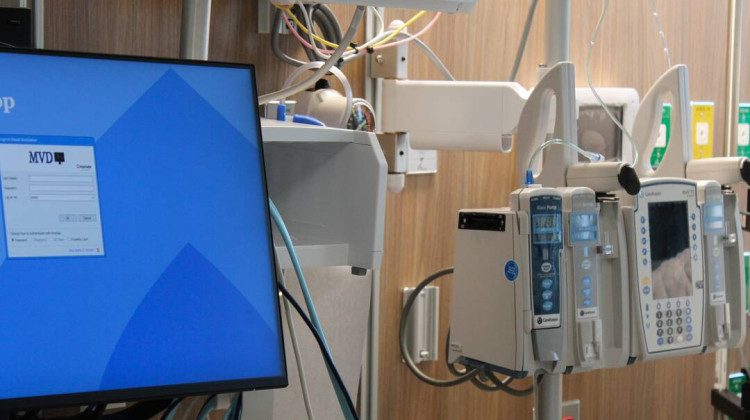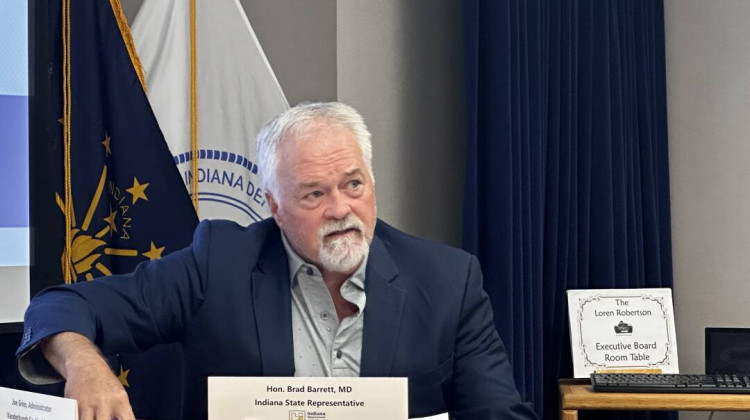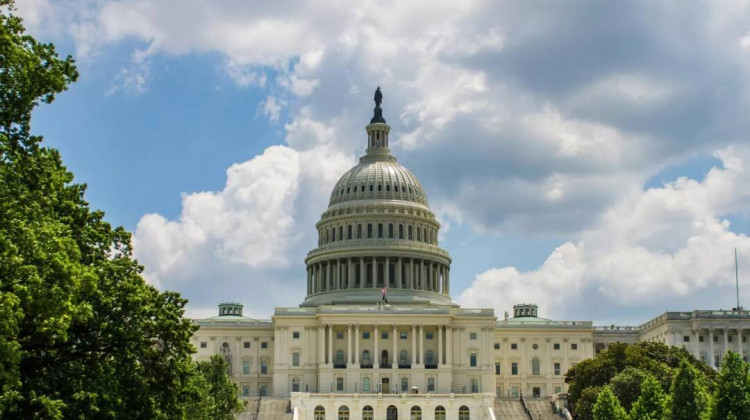TAMMY WEBBER, DEE-ANN DURBIN and ANNE D'INNOCENZIO, Associated Press

In this Sunday, March 22, 2020 photo, Bill Purdue, left, cuts pieces of fabric while Mike Rice sews them into face masks in Rice's autobody and upholstery shop in Washington, Ind. They will deliver the masks this week to Deaconess Health System in Evansville, Indiana, which asked community members to sew cloth masks for health care workers who may face a shortage amid the coronavirus pandemic. They're among legions of everyday Americans making face masks for desperate hospitals, nursing homes and homeless shelters that could run out of personal protective equipment.(photo courtesy of Robin Rice via AP)
CHICAGO (AP) — Bill Purdue waterproofs basements for a living, but he has spent the past few days in his buddy's Washington, Indiana, auto trim and upholstery shop cutting rectangles of cotton fabric that his friend sews into face masks.
Fashion designer Briana Danyele left Italy last month to return to her mother's Greer, South Carolina, home, where she has turned the living room into a mini sewing factory, making masks that she embroiders with the words, "We Got This!"
They're among scores of people answering pleas from hospitals, doctors and nurses so desperate for personal protective equipment amid the viral pandemic that they've turned to the public, saying do-it-yourself face masks are better than nothing.
And for those sitting at home worrying as the virus strains hospitals and the economy teeters, sewing masks makes them feel less helpless.
“Whatever it takes to get the job done, that's what I want to do,” said Purdue, 57, whose daughter works at the women's hospital in Evansville, Indiana. He and his friend Mike Rice responded to a Facebook post last week from Deaconess Health System in Evansville asking the public for help.
The efforts mirror those in other countries, including Spain, where mask-making volunteers include a group of nuns and members of the Spanish Air Force. Around 500 masks a day are coming off sewing machines at the Paratroop School in Murcia, in the country’s southeast, according to the Air Force’s Twitter account.
In Belgium, what began as a one-woman operation about a week ago grew to a small army of home-sewing mask-makers within days.
For most people, the new virus causes only mild or moderate symptoms, such as fever and cough. For some, especially older adults and people with existing health problems, it can cause more severe illness, including pneumonia. The vast majority recover.
But the virus is spreading rapidly and starting to max out the health care system in several cities.
Deaconess spokeswoman Pam Hight said the hospital system realized it could face a shortage if local infections skyrocket like they have elsewhere. So officials produced and posted a how-to video that has being shared across the country.
“We had people who wanted to ship them to us from all over the United States and we started saying, ‘Please, please use them in your communities,'" she said. “It makes your heart warm; people are so good.”
She said Deaconess expects to collect thousands of masks this week at an off-hospital site and sanitize them before distributing them to nurses and doctors or sending them to local nursing homes and homeless shelters.
In a similar effort, Providence St. Joseph’s Health in the hard-hit Seattle area is putting together kits using special material and distributing them to people willing to sew them together as part of a 100-million mask challenge.
Dartmouth-Hitchcock Medical Center, New Hampshire’s largest hospital, is preparing kits with fabric and elastic and encouraging volunteers to sew face masks for patients, visitors and staff so medical-grade protective equipment can be conserved for front-line health care workers.
Federal officials had previously advised hospital workers to use surgical masks when treating patients who might be infected with coronavirus amid reports of dwindling supplies of fitted and more protective N95 respirator masks.
“If nurses quit or become too fatigued or even become ill themselves, then we don't have a front line anymore,” said Wendy Byard of Lapeer, Michigan. She began organizing friends to make masks after learning her daughter, a nurse at a suburban Detroit hospital, was told to wear the same mask all day.

In this Sunday, March 22, 2020, photo, provided by Christina Hunter, Briana Danyele sews cloth face masks that say "We Got This!" in her mother's living room in Greer, S.C., which will be sent to health care workers. Legions of everyday Americans are sewing masks for desperate hospitals, nursing homes and homeless shelters amid the expanding coronavirus pandemic. (Christina Hunter via AP)
Last week the Centers for Disease Control and Prevention quietly updated its guidance, saying hospitals that run low on surgical masks should consider ways to reuse them or to use them through an entire shift. And if hospitals run out out, the CDC said, scarfs or bandanas could be used ”as a last resort,” though some health officials warned cloth masks might not work.
Mary Dale Peterson, president of the American Society of Anesthesiologists and chief operating officer at a Corpus Christ, Texas, children’s hospital, said she declined volunteers’ offers to make masks. She said construction and manufacturing industries instead should donate or sell the high-grade masks they have to hospitals.
“It would be only an extremely, extremely last resort that I would have my staff” wear homemade masks, she said. “I really hope it doesn’t get to that point in the U.S.”
At the Missouri Quilt Museum in Hamilton, Missouri, board members asked local hospitals if masks were needed and “they emphatically said yes,” said director Dakota Redford. Soon other health care providers, including ambulance crews and nursing homes, were requesting masks.
“This has been a true grassroots effort that has exploded across the country in the quilting world,” she said.
Businesses also are stepping up.
Crafts chain Joann Stores is making all of its 800-plus stores available for up to 10 people at each location to sew masks and hospital gowns, offering sewing machines and supplies, spokeswoman Amanda Hayes said.
Hayes said the number of people allowed in the stores adheres to CDC guidelines, the sewing stations will be six feet apart and staff will continuously sanitize the work areas and materials. The company also has special kits for customers who want to make masks at home.
“We’re enabling people to feel like they are contributing at a time when we don't have control,” Hayes said.
In Baltimore, almost 160 volunteers with 414 3D printers between them are making plastic face shields for Johns Hopkins and other area hospitals and dropping them off at a maker space called Open Works. Executive Director Will Holman, who organized the effort, said he laid off 21 part-time employees last week because of the virus but has rehired some to assemble, sterilize and package the shields.
Danyele, the South Carolina fashion designer, said she made about 200 masks bound for a local nursing home and hospitals in Florida, Georgia, Indiana and Illinois.
“If I'm one person creating 200 masks, imagine what we all could do," said Danyele, 24. "It's super sad that we’re at this point, but this is encouraging.”
Durbin reported from Detroit and D'Innocenzio from New York. Associated Press writers Jeff McMillan and Michael Stobbe in New York; Martha Bellisle in Seattle; Fares Akram in Gaza City, Gaza Strip; Barry Hatton in Lisbon; and Virginia Mayo in Atwerp, Belgium, contributed to this report.
 DONATE
DONATE






 View More Articles
View More Articles




 Support WFYI. We can't do it without you.
Support WFYI. We can't do it without you.